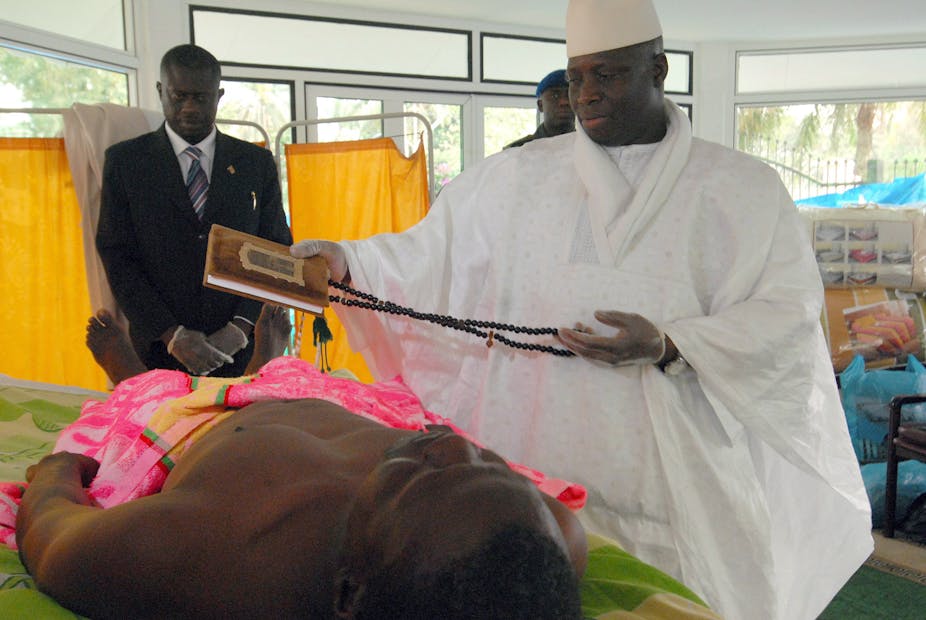With the world’s attention on the tragedy of the recent Ebola outbreak in West Africa, another awful development has largely slipped under the radar. In The Gambia, a small country frequented each year by thousands of tourists, legislation has been passed to impose life sentences for the commission of certain homosexual acts.
The Gambia is well known for its politicians’ loud and assertive anti-homosexuality stance, with the tone set by President Yahya Jammeh. In a recent speech, Jammeh opined that the LGBT acronym “can only stand for leprosy, gonorrhoea, bacteria and tuberculosis”. He said that the government would fight homosexuals in the same way that they fight malaria-spreading mosquitos, if not more aggressively.
One may worryingly infer from this statement that Jammeh believes that homosexuality is a greater threat to the country than a disease which is one of the leading causes of mortality in the region.
Yet coverage of this extreme anti-gay agenda in The Gambia has received relatively little attention compared to that in Uganda, whose plans to make homosexuality a capital offence rightly caused worldwide outrage. That’s even stranger given that much of the legislation proposed by Uganda and The Gambia is identical.
Letter of the law
Both countries have long considered homosexuality a crime, and both outlaw it in their respective criminal codes. Both codes illegalise “unnatural offences”, which includes the “carnal knowledge of any person against the order of nature”.
The same article also targets the “carnal knowledge of an animal” and imposes the same prison sentence as carnal knowledge against the order of nature – meaning, of course, that homosexuality is to be equal to bestiality in the eyes of the law.
Only a few sections later, in both criminal codes, we find articles outlawing incest and paedophilia. Under both codes a person committing any sort of “unnatural carnal knowledge” may be sentenced to up to 14 years in prison.
The views of those who passed the Criminal Codes in Uganda and The Gambia in the 1950s and 60s are clear: homosexuality is an evil, illegal abomination, akin to the crimes of bestiality, paedophilia, and incest. Yet views do not seem to have progressed much since then.
If anything, as years go by, many post-colonial governments are endorsing homophobia more enthusiastically. Both countries have taken steps to “crack down” on homosexuality, and enacted further measures to outlaw it.
According to new legislation, anyone found guilty of “aggravated homosexuality” is liable to be sentenced to life imprisonment. The less controversial examples of aggravated homosexuality include those people who have sex with someone under 18 years of age, those who have sex with their children, those who have sex with someone under their authority, and those who administer drugs to people before having sex with them. Of course, we might ask why these offences only extend to homosexual sex, rather than all kinds of exploitative sex.
The other examples of aggravated homosexuality provided by the act worryingly include “serial offenders”, and those who have sex whilst living with HIV.
Living in fear
The idea that someone is a “serial offender” perpetrates the myth that homosexuality is a lifestyle choice, and part of the insidious spread of Western culture. It also means that any gay person living in Uganda or The Gambia must either flee (as Jammeh instructed them to do in 2008, threatening them with beheading if they didn’t), or live in fear of life imprisonment, or worse.
Meanwhile, the inclusion of HIV-positive people will only further discourage members of the LGBT community in Uganda and The Gambia from getting tested for the virus. This will be even more problematic in The Gambia, where AIDS is already a highly contentious issue. Deadly misinformation and fear are prominent: Jammeh himself claimed to have found a herbal cure for HIV/AIDS in 2007, while citizens are very reluctant to come forward for testing.
The practical effects of the new Gambian legislation are already being felt. Amnesty International has reported that since the act was passed, a group of suspected homosexuals (both women and men) were rounded up by the National Intelligence Agency, where they were tortured and held without charge.
Amnesty reported that the authorities told them they would be raped, with a device being forced into their anus or vagina to test their sexuality, unless they confessed to being homosexual.
The sad reality is that the vile discrimination against homosexual people in Uganda, The Gambia, and beyond, is getting worse. In both Uganda and The Gambia, the deteriorating situation has become a dangerous, violent, state-endorsed campaign of outright hatred against homosexuals, which may yet escalate into a deadly situation for an already endangered and embattled population.
The media must keep highlighting agendas such as these when and where they arise. After all, the power and influence that political and media pressure can have in halting barbaric legislation must not be underestimated. Nor should we underestimate the terrible damage these laws will continue to do, especially if they remain unchallenged.

